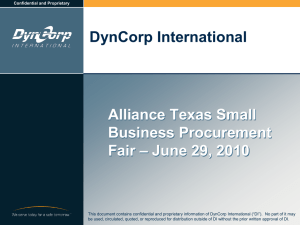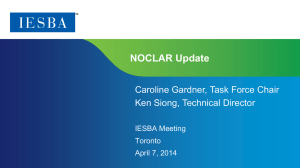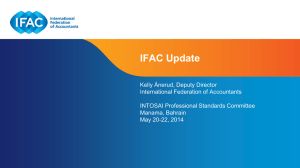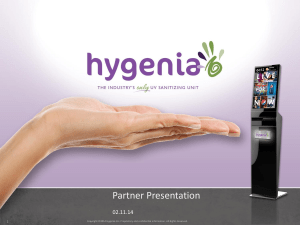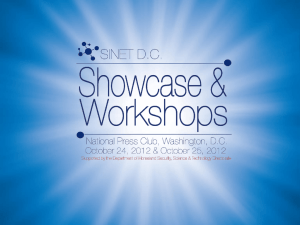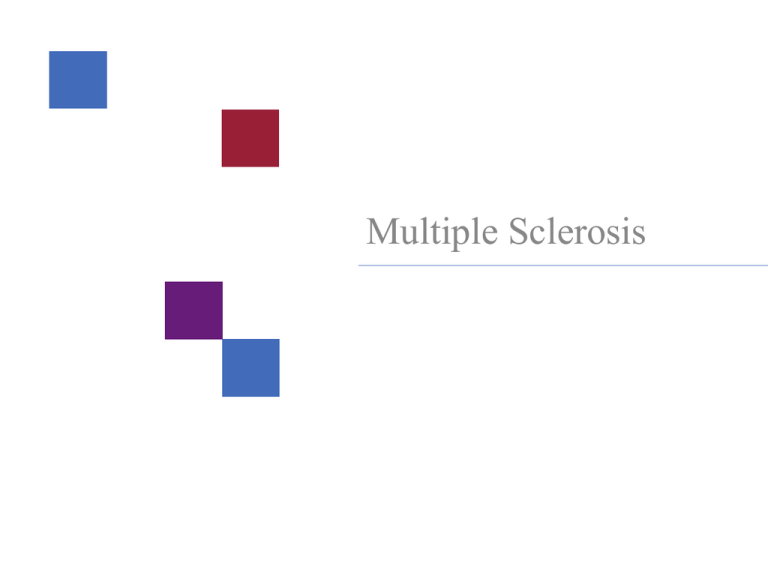
Multiple Sclerosis
This presentation contains confidential and proprietary information of Caremark and cannot be reproduced,
distributed or printed without written permission from Caremark.
©2006 Caremark. All rights reserved.
Demyelinating diseases
جایگاه ویژه ای در نورولوژی دارند به 3دلیل:
-1 شیوع ()Frequency
-2 تمایل به ایجاد بیماری در افراد young adult
Diversity of manifestation -3 که حتی برای ماهرترین پزشکان چالش برانگیز
است.
-4 سئواالت زیادی که در مورد پاتوژنز این بیماری در فیلد های مختلف علمی از قبیل
نوروبیولوژی ،ایمونولوژی ،ویرولوژی و ژنتیک مطرح است.
2
Caremark proprietary and confidential information. Not for distribution.
وجه مشترک این اختالالت التهاب و تخریب انتخابی میلین CNSاست.
سیر آنها ممکن است مزمن ( )MSیا حاد (انسفالومیلیت حاد منتشر و
لکوانسفالوپاتی حاد خونریزی دهنده).
معموال سیستم عصبی محیط ( )PNSدرگیر نیست.
تست و آزمایش اختصاص ی برای این بیماری ها وجود ندارد وتشخیص بر اساس
شناسایی الگوی بالینی distinctiveآسیب به CNSاست که توسط آن
ایجاد می شود.
3
Caremark proprietary and confidential information. Not for distribution.
Multiple Sclerosis (MS)
Epidemiology/Demographics
Pathophysiology
Clinical course
Symptoms
Diagnosis
Treatment options
4
Caremark proprietary and confidential information. Not for distribution.
Multiple Sclerosis
مشخصه بیماری :التهاب مزمنGliosis (scarring) ، Demyelinization ،
گفته می شود که ضایعات MSاز نظر مکانی و زمانی پراکنده هستند.
Ms حدود 350000نفر آمریکایی را تحت تأثیر قرار داده( 2/5میلیون نفر در سراسر دنیا)
و به استثنای تروما ،شایعترین علت ناتوانی عصبی که در early to middle
adulthoodرخ می دهد است .شایعترین بیماری مزمن نورولوژیک که افراد 20-50
ساله را گرفتار می کند.
کل بار اقتصادی MSدر سال 1997در : USAبیش از9.7 billion
5
Caremark proprietary and confidential information. Not for distribution.
Multiple sclerosis affects around 2.5 million people worldwide:
it is one of the most common neurological disorders and
cause of disability of young adults, especially in Europe and
North America.
There is a lack of epidemiological studies from Asia where the
prevalence is reported to be low, though, with the availability
of more neurologists and magnetic resonance imaging, a
larger number of patients are being diagnosed.
Although some people experience little disability during their
lifetime, up to 60% are no longer fully ambulatory 20 years
after onset, with significant implications for their quality of life
and the financial cost to society.
Caremark proprietary and confidential information. Not for distribution.
6
شواهد غیر مستقیم حاکی از اتیولوژی اتوایمون است که احتماال توسط یک
مواجهه محیطی در میزبانی که از نظر ژنتیکی مستعد است triggerمی شود.
مانند سایر اختالالت التهابی مزمن ،تظاهرات MSگوناگون بوده و از یک بیماری
benignتا بیماریی که سریع ایجاد شده و incapacitatingاست متغیر
است.
عوارض MSممکن است ارگانها و سیستمهای متعدد بدن را در گیر کند و
نیازمند adjustmentقابل توجهی در روش زندگی بیمار و خانواده اش دارد.
7
Caremark proprietary and confidential information. Not for distribution.
پاتولوژی
علت نامگذاری آن نواحی متعدد اسکاری که بطور ماکروسکوپی روی مغز قابل
دیدن است plaque .نواحی صورتی یا خاکستری با حاشیه مشخص که
براحتی از ماده سفید اطرافش قابل تشخیص است .گاهی این پالکها در ماده
خاکستری هم است .سایز آنها متنوع است .1-2 mm -several cm :حتی
تخریب کلی یا قسمتی آکسون و در موارد خیلی شدید .cavitation
8
Caremark proprietary and confidential information. Not for distribution.
رابطه بین تعداد و سایز پالکها ( )plaque burdenو شدت عالئم بالینی و
Symptomبیمار دقیق نیست .بنابراین فردی با extensive plaque
burdenممکن است mild symptomداشته باشد یا بر عکس در برخی
افراد Severely Disabledتنها تغییرات پاتولوژیک مینور مشهود باشد.
9
Caremark proprietary and confidential information. Not for distribution.
اپیدمیولوژی
F/M= 1/2قبل از adolescenceنادر است .متوسط سن شروع اوایل دهه 30است.
میزان بروز آن از teensتا سن 35سالگی بطور یکنواخت باال می رود و پس از آن به تدریج
کاهش می یابد .سن شروع آن درمردان مقداری جزئی دیرتر است .شروع MSدر 2سالگی یا
دهه 80زندگی بسیار نادر ولی اثبات شده است.
میانه بقا 30سال پس از آغاز بیماری است .امید به زندگی %75است.
در مناطقی که درصد سفید پوستان کم است(آفریقا و آسیا) شیوع کم است(< 5در 100
هزار)
جمعیتها و نژادهای قومی مختلف تفاوت در شیوع MSدارند.
10
Caremark proprietary and confidential information. Not for distribution.
Epidemiology
• Prevalence varies around the world
• Greater frequency in higher latitudes (above
40° latitude) than in lower latitudes
•
•
•
Two to three times more common in women
350,000 to 500,000 people in U.S.
The average person in the United States has about
one chance in 750 of developing MS
Sources: http://www.msfacts.org/info/info_faq.html and http://www.nationalmssociety.org/Sourcebook-Epidemiology.asp. Accessed May 9, 2006.
Caremark proprietary and confidential information. Not for distribution.
11
Demographic Factors
Age
Onset: 15 to 50 years of age
Peak onset: between 20 and 30 years of age
Onset rare before age 10 or after age 60
Gender
More common in females
- 3:1 female versus male
Race
Incidence higher in Caucasians
Sources: http://www.msfacts.org/info/info_faq.html, http://www.ninds.nih.gov/disorders/multiple_sclerosis/detail_multiple_sclerosis.htm#54263215 and
12
http://www.nationalmssociety.org/Sourcebook-Epidemiology.asp. Accessed May 17, 2006.
Caremark proprietary and confidential information. Not for distribution.
اپیدمیولوژی
باالترین شیوع شناخته شده
جزایر ( Orkneyدر شمال اسکاتلند) MS .در
کشورهای اسکاندیناوی و اروپای شمالی هم شایع است .در USAشیوع MSدر سفید
پوستان از سایر گروههای قومی بیشتر است (که با مشاهدات در سایر نقاط جهان هم
خوانی دارد) .بروز در آمریکا 36در 100هزار در سال
Ms در ژاپن خیلی نادراست ( 2در 100هزار) و در Black Africanاصوال ناشناخته
است .اما ژاپنی – آمریکایی( 4/1سفید پوستان 15در 100هزار) و آفریقایی -آمریکایی(3/1
سفید پوستان) در ریسک قابل توجه هستند.
13
Caremark proprietary and confidential information. Not for distribution.
اپیدمیولوژی
یک بیماری عمومی مناطق temperateاست .در هر دو نیمکره شیوع آن با فاصله گرفتن از
استوا افزایش مي يابد .برخی مطالعات می گویند شیوع آن در حال افزایش است .که ممکن است
ناش ی از تشخیص زودتر و بقای طوالنی تر باشد اما بروز بیماری نیز در حال افزایش است که تنها با
پیشرفتهای تشخیص ی قابل توجیه نیست.
محیط بر خطر بیماری موثر است(مطالعات مهاجرین)
مهاجرت قبل از 15سالگی از مناطق پر خطر باعث کاهش خطر می شود .مهاجرت در زمان بلوغ از
مناطق پر خطر باعث حفظ خطر باالی منطقه مهاجر فرست می شود .سن بلوغ سن بحرانی
است.
14
Caremark proprietary and confidential information. Not for distribution.
اپیدمیولوژی
کشورهای جهان از نظر شیوع به 3دسته تقسیم می شوند
-1شیوع باال :شمال ،USAکانادا ،اروپای شمالی ،جنوب استرالیا و نیوزیلند ،روسیه شرقی( بیش از
30در 100هزار نفر)
-2شیوع متوسط :جنوب ،USAاروپای جنوبی ،شمال استرالیا ،اوکراین ،آفریقای جنوبی ،مدیترانه
جنوبی( 5-25در 100هزار نفر)
15
-3شیوع کم :بقیه آسیا و آفریقا(کمتر از 5در 100هزار نفر)
عوامل موثر در اختالف جغرافیایی:
عوامل محیطی(آب و هوا و عرض جغرافیایی) ،اختالف نژادی ،اختالف در دسترس ی به مراقبتهای
پزشکی
Caremark proprietary and confidential information. Not for distribution.
16
Caremark proprietary and confidential information. Not for distribution.
17
Caremark proprietary and confidential information. Not for distribution.
18
Caremark proprietary and confidential information. Not for distribution.
19
Caremark proprietary and confidential information. Not for distribution.
20
Caremark proprietary and confidential information. Not for distribution.
21
Caremark proprietary and confidential information. Not for distribution.
22
Caremark proprietary and confidential information. Not for distribution.
23
Caremark proprietary and confidential information. Not for distribution.
24
Caremark proprietary and confidential information. Not for distribution.
25
Caremark proprietary and confidential information. Not for distribution.
26
Caremark proprietary and confidential information. Not for distribution.
Is MS a Hereditary Disease?
Genetic factors
First- and second-degree relatives are at
increased risk
Risk is higher in siblings
- Nontwin siblings (2%)
- Monozygotic twins (30%)
- Dizygotic twins (2.3%)
Susceptibility gene
Major histocompatibility
complex (MHC) on
chromosome 6
Source: http://www.msfacts.org/info/info_faq.html, http://www.ninds.nih.gov/disorders/multiple_sclerosis/detail_multiple_sclerosis.htm#54263215 and
http://www.nationalmssociety.org/Sourcebook-Epidemiology.asp. Accessed May 17, 2006
Caremark proprietary and confidential information. Not for distribution.
27
ژنتیک
استعداد زمینه ای ژنتیکی موثر و مهم است(در مطالعات بر روی گروههای قومی،
خانواده ها ،فرزند خواندگی و دوقلوها و تفاوت در شیوع MSدر گروههای
قومی که در یک محیط یکسان زندگی می کنند ثابت شده است.).
در familial aggregation MSداریم که عمدتا مربوط به ژنتیک است
تا محیط .فامیل درجه اول ،دوم و سوم فرد بیمار در ریسک باالتری برای MS
هستند %5-15 .بیماران دارای یک یا بیشتر موارد بیماری در بستگانشان هستند.
28
Caremark proprietary and confidential information. Not for distribution.
ژنتیک
خطر مادام العمردچار شدن به بیماری برای خواهر و برادر بیمار 2-3%است .برای
والدین و بچه های فرد بیمار ریسک پایین تر است.
مهمترین شواهد برای نقش ژنتیک در MSاز مطالعات دو قلوها بدست آمده است:
concordance rateدر منوزیگوت %25-30و دی زیگوت ( %2-5شبیه غیر
twinها).
توارث polygenicاست (تک ژنی نیست) با توجه به اینکه کاهش خطر بیماری با
افزایش فاصله ژنتیکی از بیمار بطور خطی نیست و هر ژن به میزان کمی خطر کلی را
افزایش می دهد.
29
Caremark proprietary and confidential information. Not for distribution.
ژنتیک
different :هم مطرح است
genetic heterogeneity فرضیه
Chromosome 6, ( می کندMS فرد را مستعدgenetic cause
)7, 19, 18
بر هر حال ژنتیک در تعامل با محیط در رخداد بیماری موثر است نه ژنتیک به
. تنهایی
30
Caremark proprietary and confidential information. Not for distribution.
ایمونولوژی
بیماری اتوایمون که T cellها در آن نقش دارند.
بیماران MSممکن است بدنبال Nonspecific URIدچار عود شوند که
نشان می دهد بعض ی ملکولهای ویروس ی ممکن است آنتی ژن میلین را mimic
کنند و باعث triggerشدن حمله شوند .یا اینکه بعض ی ویروسها ممکن است
بعنوان super Agقادر به فعال کردن T cellها در MSباشند.
31
Caremark proprietary and confidential information. Not for distribution.
ویرولوژی
گفتیم که شواهد اپیدمیولوژیک نقش مواجهه محیطی در MSرا تأیید می کند.
در high SESشایعتر است که ممکن است نشانگر این باشد که بهبود وضع
بهداشت در به تأخیر افتادن مواجهه اولیه با عامل عفونی موثر می باشد.
همانطور که می دانیم ویروسهای سرخک وپولیو neurological sequel
ایجاد می کنند که وقتی سن اولین مواجهه با آنها باال یاشد () delayed
شایعترند.
32
Caremark proprietary and confidential information. Not for distribution.
ویرولوژی
در مقایسه با گروه کنترل در سرم و CSFبیماران MSسطح Abنسبت به این
ویروسها باالتر بوده است:
سرخک ،تبخال ،واریسال ،روبال ،EBV ،آنفوالنزا ،Cپاراآنفلونزا
Human herpes type-6در پالکها وجود دارد.
تا کنون هیچ ویروس یا ماده ویروس ی به طور uniqueو Consistentاز بیماران
MSجدا نشده است.
اپیدمی MSدر جزایر فارو پس از جنگ جهانی دوم با ورود سربازان بریتانیایی مصادف
بوده که با ورود یک عامل عفونی سازگار بوده است.
33
Caremark proprietary and confidential information. Not for distribution.
چون غالف میلین مقدار زیادی چربی دارد نقش احتمالی غذای پرچرب اما ثابت
نشد.
واکسیناسیون هپاتیت در اکثر مطالعات رد شده است.
ضربه و استرس(تروما) :شعله ور شدن بیماری precipitate the ،
exacerbation in MS patients
34
Caremark proprietary and confidential information. Not for distribution.
Signs and Symptoms
Depend on clinical course and disease progression
Vary based on lesion location
Exacerbated by heat and stress
Secondary complications due to underlying
neurological dysfunction
35
Caremark proprietary and confidential information. Not for distribution.
Signs and Symptoms of MS
by Lesion Location
Optic nerve
Monocular visual loss
Scotoma
Spinal cord
Limb weakness
Spasticity and
hyper-reflexia
Urinary urgency and
incontinence
36
Caremark proprietary and confidential information. Not for distribution.
Signs and Symptoms of MS
by Lesion Location
Brainstem
Diplopia (double vision)
Pain (acute versus chronic)
- Trigeminal neuralgia,
- Aching back pain, burning
sensation, leg spasms
Numbness of face and
tongue
Vertigo (sensation of moving
around in space)
Nystagmus (involuntary eye
movements)
37
Caremark proprietary and confidential information. Not for distribution.
Signs and Symptoms of MS
by Lesion Location
Cerebrum
Impairment of
concentration or memory
Hemiparesis (unilateral
paralysis)
Hemisensory loss
Visual field defect
Cerebellum
Incoordination of limbs
Ataxic gate
38
Caremark proprietary and confidential information. Not for distribution.
Signs and Symptoms of MS
Severe fatigue
Experienced by 75% to 95% of MS sufferers
Depression
Etiology can be a:
- Symptom
- Secondary complication
- Side effect of medications
39
Caremark proprietary and confidential information. Not for distribution.
عالئم بالینی
شروع MSممکن است در اماتیک باشد یا خیلی مالیم و جزئی به نحوی که مریض به پزشک
مراجعه نکند.
شایعترین عالمت اولیه :ضعف دریکی یا بیشتر از اندامها ،تاری دید بعلت نوریت اپتیک ،اختالالت
حس ی ،دیپلوپی.Ataxia ،
ضعف :خستگی با ورزش ،اختالل ،loss of dexterity ،gaitآسیب به انگشت بزرگ پا به
خاطر ،subtle foot dropافزایش تن موتور(،hyperreflexia،)spasticity
، Babinski +عدم وجود رفلکسهای سطحی شکم (همه نشانگر )pyramidal tract dx
ممکن است وجود داشته باشند.
40
Caremark proprietary and confidential information. Not for distribution.
عالئم بالینی
)triceps jerk (مثالtendon reflex از دست رفتن
swollen, wet, raw, tightly wrapped ، پارستزی (سوزن سوزن شدن:عالئم حس ی
)در مناطقdead feeling ( خواب رفتن یاhypoesthesia )painful burning
شروع و طی ساعتها یا روزها بهtorso سریا، در یک محل فوکال اندام.مختلف بدن شایع است
.مناطق مجاور همان طرف یا طرف مقابل گسترش می یابد
cerebellar
در مراحل پیشرفته. limb , gait درataxia :درگیری مخچه
)scanning speech(dysarthria
visual loss درجات مختلفی از:نوریت اپتیک
41
Caremark proprietary and confidential information. Not for distribution.
عالئم بالینی
سال به ندرت به علت50 که البته باالیfacial pain(Trigeminal neuralgia
) . است و ایدیو پاتیک استMS
Onset in young age
Bilateral
Objective facial sensory loss
Constant rather than paroxysmal pain
trigeminal neuralgia است درMS موارد باال به نفع
42
Caremark proprietary and confidential information. Not for distribution.
عالئم بالینی
معموال همراهMS در. idiopathic Bell ,s palsy پارالیز صورت شبیه
retro aural pain وipsilateral loss of taste sensation
.نیست
و استفراغ (شبیهgait ممکن است ناگهانی همراه با اختاللVertigo
.البیرینتیت حاد) رخ دهد
. ممکن است اما غیر معمول استHearing loss
43
Caremark proprietary and confidential information. Not for distribution.
عالئم بالینی
انواع اختالالت مثانه در اکثر بیماران در زمانهایی رخ می دهد و حتی ممکن است در شروع
بیماری باشد.
Cognitive dysfunction در Advanced MSشایع است اما ممکن است
در مراحل اولیه و حتی شروع هم باشد.
افسردگی شایع است ،memory loss.اختالل توجه ،مشکل در حل مسئله ،کندی
پروسه کردن اطالعات ،اختالل قضاوت.
44
Caremark proprietary and confidential information. Not for distribution.
عالئم بالینی
Pseudo bulbar palsy که خود را بصورت emotional labiality
(اپیزودهای غیر قابل کنترل خنده یا گریه )...نشان می دهد .اکثر بیماران ، MS
heat sensitivityدارند :شروع یا بدتر شدن عالئم در مواجهه با گرما( a hot
،)showerدر زمان ورزش یا مواجهه با گرما بیمار دچار تاری دید گذرا می شود.
Fatigue در اکثر بیماران رخ می دهد:در Mid afternoonمعموال ( افزایش
ضعف موتور ,خستگی ذهنی و خواب آلودگی و . ) lassitude
45
Caremark proprietary and confidential information. Not for distribution.
عالئم بالینی
رخ میMS هستند)معموال در شروع یا اوایلrecurrent کهparoxysmal ( حمالت ناگهانی
.دهد
Tonic seizure
Paroxysmal dysarthria
Ataxia, diplopia
Transient unilateral paralysis, درد و پاراستزی
Cluster معموال بصورت. ثانیه یا بیشتر طول بکشند30 حمالت ممکن است در لحظه باشند یا
شروع و بارها در روز رخ می دهند و مریض معموال عامل زمینه ساز را پیدا می
.)particular movement یاhyperventilation(کند
46
Caremark proprietary and confidential information. Not for distribution.
What is an Exacerbation?
Neurological attacks or aggravation of symptoms
Indicative of a new immune attack on myelin
Should last at least 24 hours
Untreated attacks, can last from weeks to months
(resulting in slow recovery/residual effects)
Precipitating factors can be identified
47
Caremark proprietary and confidential information. Not for distribution.
Precipitating Factors
for Exacerbations
Fever (most common), infections – especially
urinary tract infections – without fever
Heat sensitivity
Emotional stress
Physical exertion
Fatigue
48
Caremark proprietary and confidential information. Not for distribution.
Diagnosis
Clinical findings
History
Neurologic exam
Clinical picture
Laboratory evaluations
Magnetic resonance
imaging (MRI)
Evoked potentials
Cerebrospinal fluid
(CSF) analysis
49
Caremark proprietary and confidential information. Not for distribution.
Diagnosis
Lesions disseminated in time and space
Time: More than one attack separated by
at least one or two months
Space: CNS involvement of more than
one area
Exclusion of other possible causes
50
Caremark proprietary and confidential information. Not for distribution.
McDonald criteria
The McDonald criteria for diagnosing MS were published in 2001
and revised in 2005. In common with all MS diagnostic criteria, they
seek to establish evidence of damage to the central nervous system
that is disseminated in time (evidence of lesions forming in the
central nervous system at different dates) and disseminated in space
(evidence of damage to at least two different parts of the central
nervous system).
The McDonald criteria use MRI evidence extensively to confirm an
MS diagnosis, together with lumbar puncture evidence in some
instances. They allow for an MS diagnosis to be made on the basis of
one relapse, given the right MRI evidence.
The criteria specify that an attack or relapse must last for at least 24
hours, must be a neurological disturbance typical of MS, and that
there must be at least 30 days between the onset of the first attacks
and any subsequent attack - whether seen clinically or just on MRI to count as two separate MS events.
51
Caremark proprietary and confidential information. Not for distribution.
52
Caremark proprietary and confidential information. Not for distribution.
53
Caremark proprietary and confidential information. Not for distribution.
Clinical Course:
Relapsing-Remitting (RRMS)
Most common type of MS
Signs and symptoms evolve over several days
Spontaneous improvement or in response to
corticosteroids
Full recovery or some residual deficit upon
recovery
54
Caremark proprietary and confidential information. Not for distribution.
)عود کننده متناوب(relapsing- remitting
%85 بیماران با یک .abrupt onset
حمالت مکرر غیر قابل پیش بینی .حمالت طی چند روز تا چند هفته evolve
شده و ممکن است توسط Complete, partial or no recovery
دنبال شود.
بهبودی معموال طی هفته ها تا چندین ماه از Peakعالئم رخ می دهد .اگر چه
بندرت بهبودی ممکن است 2سال یا بیشتر ادامه یابد .بین حمالت پیشرفت
اختالالت عصبی ندارند .در اکثر بیماران در اوائل سیر بیماری اینگونه هستند.
55
Caremark proprietary and confidential information. Not for distribution.
Clinical Course:
Secondary Progressive (SPMS)
Initially begins as relapsing-remitting MS
Progressive deterioration with or without relapses
56
Caremark proprietary and confidential information. Not for distribution.
secondary progressive
%50 موارد RR MSطی 10سال تبدیل به این فرم می شود.
در ابتدا مانند قبلی است اما بتدریج progressiveاست(کمی پس از شروع
بیماری یا سالها یا دهه ها پس از آن)
تفاوت با قبلی :بین حمالت نیز پیشرفت و افزایش ناتوانی را داریم.
57
Caremark proprietary and confidential information. Not for distribution.
Clinical Course:
Primary-Progressive (PPMS)
Progressive deterioration without relapses
and remissions
Occasional plateaus and temporary
minor improvements
Tends to occur in older people
58
Caremark proprietary and confidential information. Not for distribution.
Primary progressive
%10 بیماران .پیشرفت تدریجی ناتوانی از همان شروع بیماری .در برخی بیماران
دوره های clinical stabilityواضح ممکن است رخ دهد اما عود مشخص
ندارند.
اما شایعترین فرم MSدر late onset casesاست (پس از 40سالگی)
59
Caremark proprietary and confidential information. Not for distribution.
Clinical Course:
Progressive-Relapsing (PRMS)
Rare
Progressive course from the onset
Acute relapses that may or may not result in
complete recovery
60
Caremark proprietary and confidential information. Not for distribution.
Progressive relapsing
(uncommon- 5% )
Superimposed relapses همان گروه قبلی است با این تفاوت که
.دارند
61
Caremark proprietary and confidential information. Not for distribution.
62
Caremark proprietary and confidential information. Not for distribution.
Progression
Relapsing-remitting to secondary progressive
30% to 40% within six years to 10 years of onset
58% within 11 years to 15 years
90% after 25 years
Disability progression
8 years to moderate disability
15 years to severe disability
63
Caremark proprietary and confidential information. Not for distribution.
15سال پس از تشخیص تقریبا %20بیماران هیچگونه محدودیت عملکردی
ندارد.
%70در انجام major ADLمحدودیت دارند یا قادر نیستند.
Employed %75نیستند.
64
Caremark proprietary and confidential information. Not for distribution.
Factors Affecting Prognosis
Favorable
Low attack rate
Long interval to second
attack
Complete recovery from
first attack
Younger age at onset
Female sex
Low disability at 2 and 5
years
Unfavorable
High attack rate
Short interval to second
attack
Lack of recovery from
first attack
Older age at onset
Early cerebellar
involvement
Insidious motor onset
Early development of
mild disability
65
Caremark proprietary and confidential information. Not for distribution.
عوامل پیشگوئی کننده خوب
Early onset )(به جز بچگی
Visual or sensory symptom alone at presentation
A relapsing- remitting course
Minimal neurologic impairment 5 years after onset
66
Caremark proprietary and confidential information. Not for distribution.
Poor prognosis
Truncal ataxia
Severe action tremor
Primary progressive course
67
Caremark proprietary and confidential information. Not for distribution.
Diagnostic categories of MS
“The phrase ‘multiple abnormalities in space and time’
sums up what a physician needs to find a diagnosis of
MS” (O’Connor 32).
There are three categories of MS; Definite, Probable,
and Possible MS.
68
Caremark proprietary and confidential information. Not for distribution.
Definite MS:
“Consistent course (relapse-
remitting course with at least 2 bouts
separated by at least 1 month or slow or
stepwise progressive course for at least 6
months) of documented neurological signs of
lesions in more than one site of brain or spinal
cord white matter” ( Hope 7). The age of
onset is between 10 and 50 years of age.
69
Caremark proprietary and confidential information. Not for distribution.
Probable MS:
Here the signs are not previously
documented and there is one current sign of MS.
There is more than one site of lesions, they have
a good recovery and have a history of relapse-
remitting symptoms.
70
Caremark proprietary and confidential information. Not for distribution.
Possible MS:
There is no documented signs
of MS and more than one lesion. There is also
a history of one relapse-remitting symptoms.
71
Caremark proprietary and confidential information. Not for distribution.
Treatment Goals
Reduce (control) relapses
Delay disease progression
Delay disability
Alleviate symptoms
:دو دسته است
arrest dx process ( dx modifying Rx)
symptomatic Rx
72
Caremark proprietary and confidential information. Not for distribution.
Early Treatment
The National MS Society recommends:
“Initiation of therapy with an immunomodulator is
advised as soon as possible following a definite
diagnosis of MS with a relapsing course, and may be
considered for selected patients with a first attack
who are at high risk for MS.”
Source: Recommendation of the Executive Committee of the Medical Advisory Board of the Nat’l MS Society
www.nationalmssociety.org/Sourcebook-Early.asp. Accessed May 17, 2006.
Caremark proprietary and confidential information. Not for distribution.
73
Current Therapies:
Immunosuppressants and Immunomodulators
Corticosteroids
Interferons :
Betaseron (interferon -1b)
Avonex (interferon -1a)
Rebif (interferon -1a)
74
Caremark proprietary and confidential information. Not for distribution.
Current Therapies: (cont.)
Immunosuppressants and Immunomodulators
Immunosuppressants and immunomodulators:
cornerstone of therapy (cont.)
Copaxone (glatiramer acetate)
Novantrone (mitoxantrone)
Symptomatic management
75
Caremark proprietary and confidential information. Not for distribution.
Corticosteroids
Symptomatic management
Used in moderate-to-severe exacerbations
IV methylprednisolone 500 mg/day for five days
followed by oral prednisone (optional)
Hasten clinical recovery
Delay recurrence of neurologic events
Does not alter the course of MS
76
Caremark proprietary and confidential information. Not for distribution.
Immunosuppressants
Show only slight evidence of benefit in MS
Used only for progressive MS
Associated with serious side effects
Thiopurines (Imuran)
Methotrexate
Alkylating agents (Cytoxan)
Cyclosporine
This page contains prescription brand drugs that are registered or trademarks of pharmaceutical manufacturers that are not affiliated with Caremark.
Caremark proprietary and confidential information. Not for distribution.
77
Ms معموال به دنبال مواجهه مریض با گرما ،استرس و عفونت ( viral ، UTI
)inter current illness ،infectionبطور موقت بدتر می شود:
)pseudoexacerbation(duration < 48 hr
فرم عود کننده MSمعموال به طور متوسط کمتر از یک عود Trueدر سال را
تجربه می کنند.
حمله حاد Me PDN/PDN :اگر شدید است و اختالل عملکردی داده و
هرگونه . Symptomatic Rxتا گذر زمان وضع رامشخص کند.
78
Caremark proprietary and confidential information. Not for distribution.
Symptomatic Treatments
Problem
Symptoms
Management
Spasticity
Painful spasms in the
lower and upper limbs
Remove irritating factors
Physical therapy,
baclofen, diazepam,
dantrolene
Paroxysmal phenomena
Trigeminal neuralgia,
pain, tonic seizures
carbamazepine,
Neurontin, phenytoin
Fatigue
Feeling tired (morning or
early afternoon)
Energy conservation,
amantidine
Depression
Common, occurs in high
percentage of patients
Anti-depressants
Sexual dysfunction
Inability to produce/
sustain an erection
Behavioral therapy
Viagra
Urinary dysfunction
Urgency, frequency and
retention
Detrol, Ditropan, Botox
Note, some of the drugs listed are shown for off-label use.
This page contains prescription brand drugs that are registered or registered trademarks of pharmaceutical manufacturers that are not affiliated with Caremark.
Caremark proprietary and confidential information. Not for distribution.
79
خود کش ی علت مهم مرگ در MSاست پس باید حواسمان به افسردگی می باشد.
مشاوره شغلی و سایر سرویسهای حمایتی به بیمار و خانواده اش در Cope with
dxکمک می کند.
Health maintenanceمهم است :کاهش استرس ،خودداری از کاهش وزن
سریع ،رژیم غذایی متعادل ،استراحت کافی
هنوز شواهد کافی دال بر رابطه واکسیناسیون با عود MSپیدا نشده است اما از
واکسیناسیون غیر الزم باید خود داری کرد.
80
Caremark proprietary and confidential information. Not for distribution.
شنا ورزش ایده آلی برای بیماران است ( به علت هیپوترمی که ایجاد می کند و اثر
شناور کنندگی آن).
حاملگی ممکن است سیر بیماری را تحت تاثیر قرار دهد .در مقایسه با غیر حامله ها
حمالت کمتر طی حاملگی ولی حمالت بیشتر طی 3ماه پس از زایمان .این دو همدیگر را
خنثی می کنند پس بطور کلی حاملگی تأثیری بر ناتوانی یا سیر کلی بیماری ندارد.
PRLباال پس از حاملگی و شیر دهی که سبب تحریک ایمنی می شود که افراد را
مستعد عود MSمی کند.
81
Caremark proprietary and confidential information. Not for distribution.
مطالعات در ایران
سال :1993شیوع خام در استان فارس 3/5در 100هزار نفر
سال 1998بررس ی استعداد ژنتیکی ایرانیها به :MSبرخی HLAها در بیماران
بیشتر بود و رابطه مثبت پیدا شد اما از نظر آماری معنی دار نبود.
بررس ی 149بیمار طی 1997 -99در استان فارس :نسبت زن به مرد 2/1به . 1
مطالعات قبلی در ایران 52/1به .1
82
Caremark proprietary and confidential information. Not for distribution.
میانگین سن بیماران 7/32سال.
در سالهای اخیر بروز در ایران افزایش یافته است.
شایعترین عوامل زمینه ساز در این مطالعه به ترتیب قدرت :حاملگیviral ،
) Major anxiety dx ،exanthema in childhood(50%و MDD
در زمان بیماری ،شرکت در جنگ ایران و عراق( %14به مدت 12 -+ 5/2ماه و قبل از
شروع بیماری) ،جراحی عمده و ترومای شدید(در حدود %30بیماران و قبل از شروع
بیماری).
اکثر بیماران low SESبودند.
83
Caremark proprietary and confidential information. Not for distribution.
سال 2009
نسبت زن به مرد 3به 1
دوازده هزار نفر بیمارعضوانجمن اما آمار واقعي شاید 35-40هزار
سال 1389
آمار بیماران بیش از 18هزار نفر است.
1391
40 هزار بیمار مبتالبه ام.اس در ایران وجود دارد
شیوع بیماری MSدر ایران برابر با میانگین جهانی 50در 100هزار
نفر برآورد شده است.
شیوع بیماری MSدر ایران در مقایسه با 20سال گذشته روند افزایشی
داشته
84
Caremark proprietary and confidential information. Not for distribution.
Conclusion
Early treatment may delay disability and enhance
recovery from relapses
Treatment must be a cooperative effort between
multidisciplinary team of healthcare providers
Medications are not a cure for MS
85
Caremark proprietary and confidential information. Not for distribution.
Challenges
Challenges for the person with MS
Physical difficulties
Financial concerns
Social issues
Emotional issues
86
Caremark proprietary and confidential information. Not for distribution.
87
Caremark proprietary and confidential information. Not for distribution.
88
Caremark proprietary and confidential information. Not for distribution.
89
Caremark proprietary and confidential information. Not for distribution.


